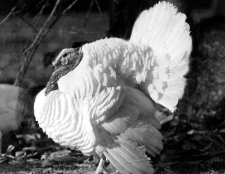By Stephen Vance, Staff
 With the month of December underway, many are now focused on the upcoming holiday season. Lists are being written, gifts are being purchased and wrapped, and homes and businesses begin to sparkle with seasonal decorations.
With the month of December underway, many are now focused on the upcoming holiday season. Lists are being written, gifts are being purchased and wrapped, and homes and businesses begin to sparkle with seasonal decorations.
One of the decisions many families make each year is what to prepare for those special family dinners that are just a few weeks away. Meaford’s Cirrus Hill Farm has some options that you might not have considered – Heritage birds.
Whether your holiday tradition involves turkey, goose, or even duck, Cirrus Hill has a heritage variety that will taste less like a supermarket bird, and more like what our great-grandmothers would have set upon the table for the family holiday feast.
A heritage breed (turkey or other domesticated farm food animal) is a purebred, true breeding variety of some relative antiquity, dating to before industrial agriculture. Some of those breeds can boast as little as 60-70 or as much as 2500 years in the service of humans. To be a heritage breed, it must be able to reproduce itself naturally (no artificial insemination), and to grow at a natural rate under outdoor, traditional farming methods.
The typical supermarket turkey on the other hand, has been bred to be raised in an indoor factory farm as a commodity, and is sold below the cost of production at the holiday. It has been bred to reach market size in 6-16 weeks, while the natural growth rate of heritage breeds take 6-7 months to roaster size. The supermarket turkey is biologically fragile, and overgrows its legs and generally has a pretty miserable short life, no matter how kindly the farmer – it’s just part of being a designed to be a profitable commodity product.
“A heritage bird, raised traditionally scouts much of his own food, and has quite a jolly life of daily adventure on the farm, if he doesn’t get eaten prematurely,” says Cirrus Hill.
From a cost perspective, Cirrus Hill Farm says that a heritage bird, raised traditionally should cost nearly double what a private or home raised industrial breed turkey would cost. If fully organic, even more. This is because it requires longer (nearly twice as long) to raise, and eats (and is up to mischief) every day. It also reflects the extra expense of obtaining the poults from specialty hatcheries and getting small numbers of birds (non-quota farmers are limited to the number of birds that they can raise by supply marketing regulations) processed.
Cirrus Hill Farm must transport their birds nearly two hours away to reach a custom processor, who charges significantly more than what an industrial processor would charge a factory farmer. All of these additional costs make heritage breeds difficult to bring to market in competition with commodity industrial farmers working under the supply management monopoly system, making them a gourmet niche product, or requiring some subsidy on the part of the farmer, especially to create markets.
Those willing to spend the extra money on a heritage turkey, goose, or duck won’t be disappointed says Cirrus Hill Farm. A more firm, much more flavourful meat, and an incredible gravy are some of the benefits of heritage breeds. Unlike many commercial turkeys, traditionally raised birds are not waterlogged or pumped full of broth and canola oil, so the heritage turkey (or other fowl) will cook more quickly – and cooks may want to haul out Grandma’s recipes to ensure proper cook times. Any cook book published before 1950 is most likely expecting you to have a heritage turkey to cook.
If you’re looking to bring an old twist to your holiday table, you can contact Cirrus Hill Farm by email – info@cirrushillfarm.ca for more information or to order. Supplies are limited, so it is advised to contact them early if you would like a locally-grown heritage bird on your holiday table.
Extensive information about the breeds raised at Cirrus Hill Farm can be found on their website – cirrushillfarm.ca












